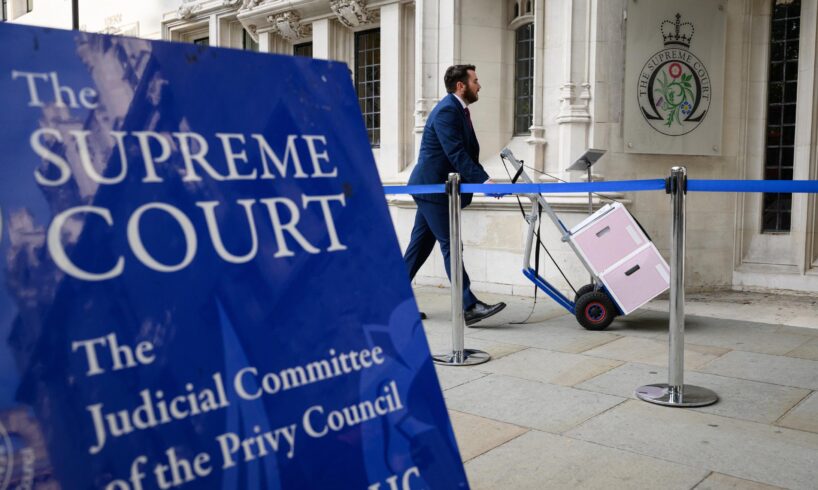
But the suggestion drew strong criticism from campaigners, who said the Scottish Government was misrepresenting the law.
“Services are either single-sex or open to everyone, and there are no circumstances where it is legally possible to provide a service for ‘biological women and trans women’,” Trina Budge of For Women Scotland told The Herald.
READ MORE
Three months ago, the UK’s highest court ruled that “women” and “sex” in the Equality Act 2010 referred to biological sex rather than gender identity.
The court case was brought by FWS after they challenged the Scottish Government’s guidance on the definition of “woman” in the Gender Representation on Public Boards (Scotland) Act 2018.
Following the Supreme Court ruling, the commission issued draft guidance on a range of topics, including how single-sex services can be lawfully provided, when trans people can be excluded, and when organisations might request a birth certificate or Gender Recognition Certificate.
The draft said any service offered to “women and trans women” is not a single-sex service under the Equality Act and could amount to unlawful discrimination against those of the opposite sex.
The EHRC later opened a consultation on the draft to help formulate an updated Code of Practice. The commission said it received more than 50,000 responses.
Final guidance had been expected before Parliament broke for summer earlier this week, but the EHRC said last week it would be published later in the year.
For Women Scotland won the Supreme Court in April (Image: PA) The Scottish Government quietly published its response to the consultation on Friday afternoon.
Ministers raised concerns that the commission’s draft code placed too much emphasis on when trans people can be excluded from services, and not enough on how services can remain inclusive within the law.
“We consider that it would be helpful to provide illustrative examples within the Code of Practice to provide guidance on how a service provider may lawfully implement an inclusive approach,” the Government said.
“This would be particularly helpful in situations where a service provider has identified a need that exists for both biological women and trans women, for example in relation to those who have experienced domestic abuse, homelessness or trafficking.
“Without this clarity, providers may simply stop offering any services to trans people due to concerns about legal risk.”
They also warned that, following the judgment, some trans people had chosen to “remove themselves from public life” out of fear of being turned away from services.
In its submission, the Scottish Government also said it was also concerned about what it described as “social policing” of someone’s sex.
“We note that the impact of the guidance may lead to situations where some members of the public will take it upon themselves to judge appearances and assume someone’s sex based on their perception of that person’s sex or gender identity.
“This sense of distrust in others and social policing of bodies is detrimental not only for trans and non-binary people, but for those who are born male or female who may not fit into society’s current expectations of what a man or woman looks like, which change over time, and in different contexts and places.”
The response also called for advice on how to apply the updated definition of legal sex to workplace facilities, and for consideration of the impact of the code on intersex people.
Ms Budge said: “The Scottish Government still woefully misunderstands the Supreme Court judgment on how the Equality Act works.
“Services are either single-sex or open to everyone, and there are no circumstances where it is legally possible to provide a service for ‘biological women and trans women’.
“We note that in pushing for this option, the Government has dropped its previous legal argument that a man needs a GRC to access a women’s service and reverted to, once again, looking for ways to include men in women’s services on a self-ID basis.
“Women who have suffered domestic abuse or trafficking do not wish to be put in sleeping accommodation with males for very good reasons of privacy and safety, and it is beyond our understanding why the Government keeps trying to insist otherwise.”
Lucy Hunter Blackburn from the MBM policy collective said: “The response suggests that the Scottish Government has learnt little from the past few years.
“It remains fundamentally unsympathetic to the rights and needs of women as a sex, and strongly wedded to defining ‘women’ as a group that must include some men.
“As a result, it appears to misunderstand both the judgment and the role of the EHRC. It still seems to believe, wrongly, that managing single-sex services and spaces must involve ‘balancing’ the rights of women against those of a sub-set of men.
“It is resisting clarity in favour of complication, and in doing so providing poor leadership to all Scottish public bodies who now just need to make the law work on the ground.”





